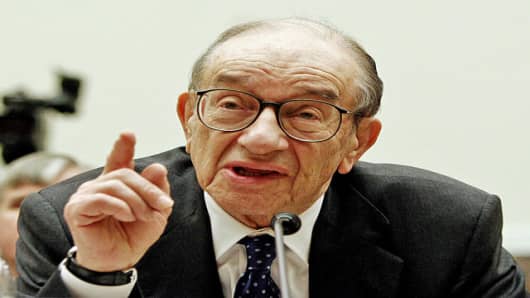Former Federal Reserve Chairman Alan Greenspan said on Friday that U.S. house prices have not bottomed out after a crisis in the subprime mortgage market.
"The markets are becoming aware that the decline in U.S. housing prices is not stopping. It is at an unprecedented pace compared to the last 50 years," Greenspan told a financial
audience in the Norwegian capital.
He said the housing bubble had burst and the market was "a good deal away" from its selling climax -- a point at which sellers ultimately lower their prices to match lower bids.
This was reflected in the large stock of unsold homes and low turnover, which will be overcome only once people start believing such assets are undervalued.
"We are beginning to see all sorts of asset prices weakening ...(so) where home prices stabilise is critically important for the economic outlook," said Greenspan, who left the Fed in 2006.
He said house prices underpin the mortgage market and also have a "wealth effect" on home-owners.
"The probability of a recession would be higher than 50 percent if it hadn't been for such a remarkable degree of flexibility," Greenspan said at an event organized by Norwegian broker First Securities.
Last month he said he saw the chances of a U.S. recession at "less than 50 percent."
Greenspan said that despite the subprime market fallout the U.S. corporate sector was faring "remarkably well," as were economies in other parts of the world, such as in Asia and Latin
America.
He said the inflationary impact of a weakening dollar has varied over time and that central banks need to address the issue to the extent they believe it affects price stability.
Asked if the Fed should take the weak dollar into account, he said: "To the extent that a weakened dollar is of such a margin that it creates problems, then yes, the central bank
needs to address that. One has to ask what are the inflationary consequences of a weakening of the dollar."
"It turns out that sometimes it is not important, sometimes it is very important," Greenspan said.
Greenspan added that during his tenure as Fed chairman from 1987 to 2006 "we didn't have to be concerned about a weak dollar at the time."
He said central banks should concentrate on alleviating the economic fallout from burst asset bubbles because they had few methods to prevent them and "lean against the wind."
"There doesn't seem to me that there is very much evidence that we can do much about them," said Greenspan, who oversaw Fed policy during the dot-com bubble and the start of the present housing bubble.
"Irrespective if we could identify them, we could not do much to defuse them," he said of asset bubbles.


